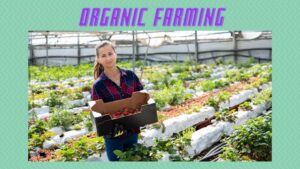This article on Organic Farming Advantages and Disadvantages. So, let’s start…

Introduction-
Organic farming is also called Bio-farming. It is a form of agriculture that avoids the use of synthetic fertilizers and pesticides and supports plant growth naturally. Bio farming or organic farming relies on crop rotation, animal manures, and biofertilizers, etc. It relies on mechanical cultivation to maintain soil productivity, supply plant nutrients, and control weeds, insects, and other pests. Bio-farming also avoids the use of genetically modified crops of organisms.
Advantages of organic farming-
There are various advantages of Bio-farming. These are as follows-
- It increases productivity at a lower cost. After a short period of drop in yield, it is more productive than chemical farming.
- It is environmental friendly. Green pesticides such as neem, compost tea, dried leaves, and spinosad are environment friendly and non-toxic. On the other hand, conventional agriculture is based on chemical farming, which harms natural resources and causes many diseases like cancer in human beings.
- It reduces food contaminations and provides fresh and healthy vegetables and fruits.
- It enhances soil fertility. The absence of chemicals in Bio-farming does not kill microbes which increases nourishment of the soil. It helps in balancing the nutrients of the soil.
- It works as resistance to disease and pests. It enables farmers to get rid of irksome weeds without use of any chemical.
- It increases drought tolerance. Organically grown plants are more drought tolerant. it demands low water in comparison to chemically supported crops.
Disadvantages of organic farming-
There are some disadvantages of Bio-farming. These are as follows-
- It produces low productivity in comparison to genetically modified crops. It can not produce as much as yield conventional or industrialized farm.
- It requires more skills. For this, a farmer requires a greater understanding of his crops. He also needs to keep close water on his crops as there are no quick fixes involved like pesticides or chemical fertilizers.
- It is time consuming. A significant amount of time and energy is required for its detailed methods and techniques.
Organic farming in India-
Indian farmers are getting aware and interested in Bio-farming. India’s struggling farmers are starting to profit from a budding interest in organic living. According to organic experts, is the incomes of bio farmers are soaring by 30% to 200% and their yields are rising. It is so because the pesticide poisoned land is repaired through natural farming methods. There’s 10% to 20% premium to be earned by selling organic products abroad and in some of the big Indian cities. Now Indian people are very much health-conscious so they prefer organic crops over conventional crops. This creates a huge market for Bio-farming in India.
Conclusion-
Organic culturalists believe that once the awareness increase, more farmers will join the movement because it is favorable to small farmers. They already have the cows and buffalos needed to recycle biomass at the farm level. It is essentially the foundation of Bio-farming. Organic farming if practiced properly reduces the input costs for fertilizers, pesticides, and seeds. It increases the fertility of the land. It also gives tastier, safer, and more nutritious crops produce.
Thank you guys for devoting your precious time to this blog. Please share your feedback in the comment section.
Nice defined. Keep it up.